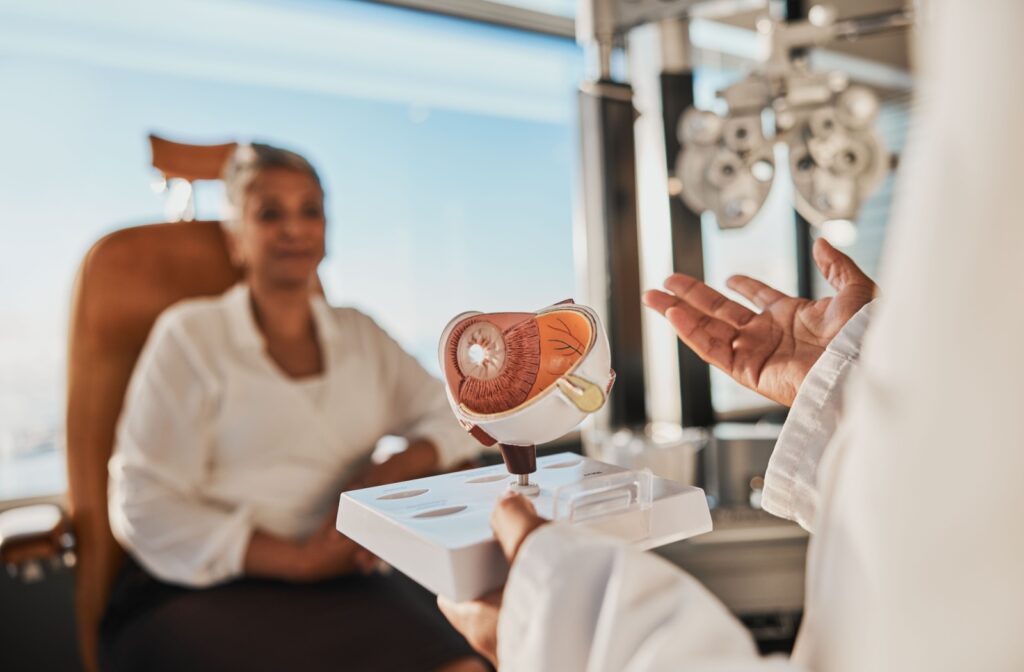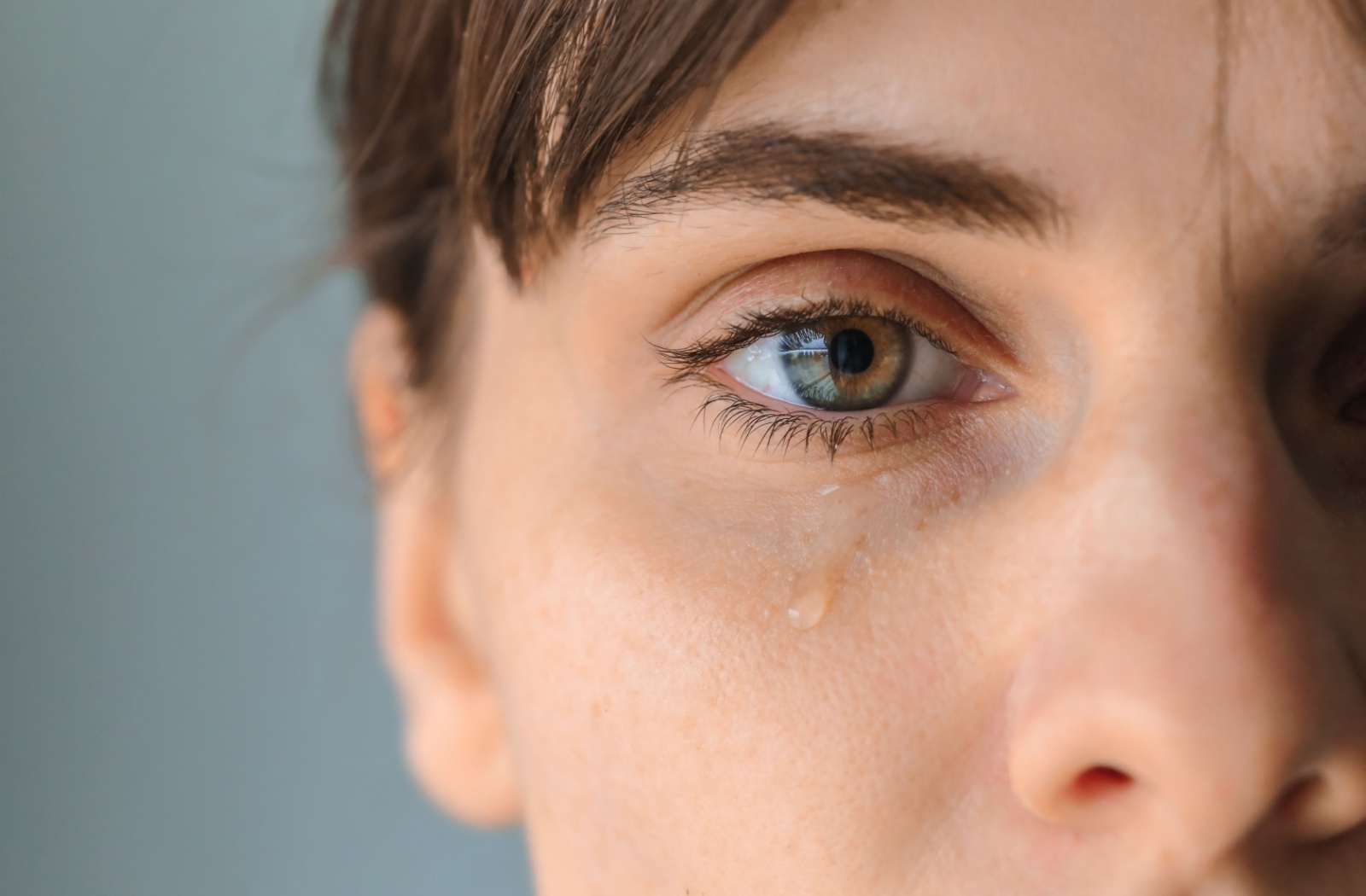Redness, burning, and discomfort are all symptoms associated with dry eyes. While it sounds counter-intuitive, watery eyes are also one of them.
Watery eyes are better understood as a positive feedback loop within your body.
When your eyes are dry, a signal is sent to your brain, leading your body to produce excess reflexive tears to compensate for the dryness.
These tears offer no nourishment to the eye’s surface and don’t address the underlying cause of dry eye, leaving you in a frustrating cycle of dryness and excessive tearing.
All About Dry Eyes
Dry eyes are marked by a gritty, dry sensation, often prompting patients to vigorously rub their eyes in hopes of finding short-term relief. Rubbing your eyes is never advised and can cause more harm than good.
Dryness develops when the tear film becomes unstable. The tear film plays a key role in maintaining good visual clarity and ocular health and consists of several layers. A problem with any of these layers can lead to instability, causing dryness.
Two main types of dry eyes develop as a consequence of an unstable tear film, each tied to the way they produce, or fail to produce tears:
- Aqueous Deficient Dry Eye: This occurs when lacrimal glands along the eyelids fail to produce enough tears to keep the eyes adequately moisturized.
- Evaporative Dry Eye: This is caused by rapid evaporation of tears from the eye’s surface due to insufficient oil production and is often due to Meibomian Gland Dysfunction (MGD).
If you’re unsure of whether you’re experiencing dry eyes, here are some symptoms to watch out for:
- Redness in the eyes
- Excessive tearing
- Sensitivity to light
- A burning, stinging sensation
- Blurred vision or difficulty focusing
- A persistent feeling of dryness, grittiness, or sand in the eyes
Anyone can develop dry eye, but certain factors can increase the risk of developing this condition, including:
- Age, as tear production naturally declines as we grow older.
- Lifestyle factors like improper contact lens maintenance, prolonged exposure to digital screens, and not removing eye makeup before bed.
- Environmental conditions like dry, smokey, or windy climates encourage tear evaporation.
At first, dry eyes may not appear concerning. But, persistent dryness can lead to discomfort, impacting your ability to perform daily tasks. Plus, leaving dry eyes unmanaged can increase the risk of developing serious complications, highlighting the importance of dry eye therapy.
Why Can Dry Eyes Cause Excessive Tearing?
Dry eyes can cause excessive tearing and watery eyes which sounds paradoxical but is better understood as a positive feedback loop within your body.
When the eyes are dry, they send distress signals to the nervous system, triggering a reflex mechanism. In response, the body produces excess reflexive tears to compensate for the dryness.
However, these reflex tears primarily consist of water and lack the essential oils and mucus needed to hydrate the eyes adequately. As a result, the excessive tearing provides temporary relief, doesn’t have the balanced composition needed to nourish the eyes or maintain a stable tear film, and doesn’t address the underlying cause of dryness.
This incomplete hydration can perpetuate the cycle of dryness, leading to a continuous cycle of watery eyes as the body tries to compensate for the lack of moisture.
Similar to vigorously rubbing your eyes, excessive watering doesn’t offer long-term relief from dry eye symptoms. Targeting the root cause of dryness is key to finding long-term relief.

Managing Dry Eyes
The chronic nature of dry eye disease means it can’t be cured but can be effectively managed by addressing its underlying cause to alleviate symptoms.
Visiting your optometrist for a dry eye consultation is helpful for your road to dry eye relief. This appointment will help determine the underlying cause and severity of dryness by examining the health of your eyes and tear film.
From over-the-counter solutions to at-home remedies, this dry eye consultation allows your optometrist to develop a therapy plan tailored to your ocular needs for long-term relief.
Advanced Therapies
These treatments are done in the clinic by your optometrist. They are relatively gentle, non-invasive, require no downtime, and can be paired with at-home remedies to maintain results.
At Visionary Eye Centre, we pride ourselves in offering:
- iLux Treatment: This device unclogs meibomian glands along the eyelids using controlled heat and gentle pressure to restore balance to the tear film.
- Punctal Plugs: These are tiny medical devices inserted into the tear ducts to prevent tears from draining too quickly. This tear retention helps combat aqueous dry eye, keeping your eyes moisturized for longer periods.
At-Home Therapies
Don’t underestimate the power of tried-and-true at-home remedies for dry eye relief and small lifestyle changes to help promote a balanced tear film:
- Artificial tears: These over-the-counter eye drops mimic the natural composition of your tears to keep your eyes hydrated. Look for preservative-free options if you’re looking to use them frequently.
- Warm compress mask: Applying a warm compress over your eyes and gently massaging around the area can help unblock oil glands and improve the quality of your tears.
- Omega-3 fatty acids: A diet rich in omega-3s (found in foods like salmon, walnuts, and flaxseeds) may help reduce dry eye symptoms. You can also consider supplements after consulting with your doctor.
Small lifestyle adjustments to your daily routine can also make a difference:
- Reducing screen time or taking regular breaks using the 20-20-20 rule helps prevent digital eye strain, which can aggravate dry eye symptoms.
- Using a humidifier in your space to maintain solid humidity levels helps prevent excessive dryness in the air that can affect your eyes.
- Drink plenty of water throughout the day to promote overall hydration! Aim to drink about 8 to 10 glasses of water a day.
- Follow proper contact lens care and adhere to the wear schedule. Misusing your contacts can aggravate dryness and increase the risk of complications.
Schedule a Visit
It may feel confusing, but experiencing watery eyes develops as a response to dry eyes. While it may offer temporary relief, it doesn’t target the underlying cause of dryness. Connect with our team at Visionary Eye Centre to schedule your dry eye consultation to learn which therapy option is most appropriate for your ocular needs.







